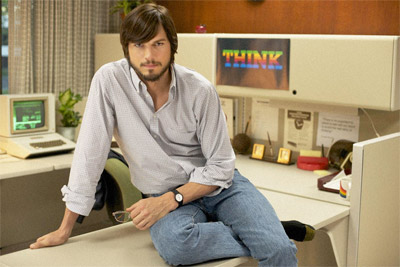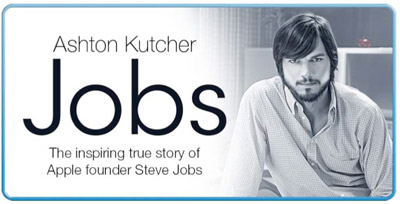Ashton Kutcher Jobs Interview

Ashton Kutcher Jobs Interview
Cast: Ashton Kutcher, Dermot Mulroney, Josh Gad, Matthew Modine, John Getz, Lukas Haas, J.K. Simmons, Lesley Ann Warren
Director: Joshua Michael Stern
Genre: Biography, Drama
Rated: M
Running Time: 129 minutes
Synopsis: Jobs is the powerful and true story of the visionary who set out to change the world and did. The film chronicles Steve Jobs transformation of character from the enthusiasm and self-discovery of his youth, to the personal demons that clouded his vision and finally to the ultimate triumphs of his later life. Mark Hulme and Five Star Feature Films launched the production immediately following Jobs' retirement in August 2011. Screenwriter Matt Whiteley, while penning the script, utilised a team of expert researchers based on months of exhaustive research and interviews with Steve Jobs' friends, colleagues and mentors to develop the most truthful and gripping picture of Jobs' life.
Jobs
Release Date: August 29th, 2013
About the Film
Pre-Production
The story of this man –the CEO of a massive technology company, who had helped to shape and form our modern, tech-driven lives– and his retirement, had brought the world to its knees. A man so few of us had a personal connection to had caused daily business to slow to a crawl, and sent the Internet into a stunned, rabid state of news consumptions unlike few dates in history.
Mark Hulme knew from that moment, from the look of his employees to the press around the world, that this was a story and an inspirational entrepreneurial tale that needed to be told accurately, honestly, and fully for audiences around the globe. Mark Hulme then tapped into his resources and asked a member of his creative marketing staff, Matt Whiteley, to pen the screenplay of Steve Jobs' life.
Matt Whiteley, backed by a knowledgeable and meticulous research team, began work immediately on bringing this fascinating American story to life. When Steve Jobs passed away in October of 2011, Matt Whiteley was already well underway in the script writing process, and by the end of the year, the expansive, sweeping story of JOBS had exceeded 250 pages in length.
Early in 2012, understanding the importance of the project in bringing Steve Jobs' life story to the big screen, director Joshua Michael Stern joined the project and helped to bring it to the attention of critical players in Hollywood. Inspired by the story on the page, and by the passion of the team behind the project, Joshua Michael Stern was eager to get involved.
'There was something about the way it was written and the way it flowed and the way the character was portrayed that had me turning pages and thinking, -This is actually really good,'" the director recalls.
With the dramatic character arc of its protagonist and three-part structure, Joshua Michael Stern says Matt Whiteley's script had a Shakespearian quality. It mapped Steve Jobs' early years, his fall and subsequent wandering in the proverbial wilderness, and finally his redemption through his corporate takeover of not just the company, but the entire computer industry.
It's a story Joshua Michael Stern expects will have multiple incarnations in future years. 'My goal from the beginning of this process was to make the definitive version," he says. 'To enter into it with anything less from me would have been futile."
Ashton Kutcher Joins the Team
The filmmaking process went into overdrive when Ashton Kutcher (Two and a Half Men) came aboard.
'He read the script, I understand, in a day," Mark Hulme says.
Ashton Kutcher met with Joshua Michael Stern two days later and, a day after that, emerged as the filmmakers' clear pick for the part. 'It really happened that quickly"which was, of course, pivotal because Steve Jobs' character has over 40 percent of the dialogue in this movie," Mark Hulme says.
Ashton Kutcher was a perfect fit for the lead role, says Mark Hulme, and not just because he shares a nearly uncanny resemblance with the longtime Apple icon. 'He's got this sort of deep connection with Steve Jobs," Mark Hulme says. 'The love and undersanding for technology which Ashton Kutcher is all about, and the fact that he's been an Apple stock owner for 10 years. I think he's always connected, always sympathised, and he's an incredibly intelligent individual."
Joshua Michael Stern was equally impressed by how right Ashton Kutcher was for the role. 'When I first met Ashton Kutcher, he already, on some level, walked in as Steve Jobs," the director recalls. 'I walked out of that meeting pretty much attuned to the fact that he should get the part. He's amazing in it. He truly is committed emotionally to the core. It's not just about posing and mimicry."
Some of Ashton Kutcher's co-stars were blown away by his in-depth knowledge of computer technology, including Lukas Haas (Inception, Witness) who plays the role of Daniel Kottke"the friend Steve Jobs went to India with as a young man. Haas recalls a moment between takes where he was soldering a motherboard for the Apple I computer.
'I'm just soldering it together and I don't know what the hell this is"I have no idea how this stuff works," Lukas Haas says. 'And Ashton Kutcher literally just started talking about it. He studied everything. He knows everything about Apple, about Steve Jobs, about how the circuitry works."
For his part, Ashton Kutcher"an avid consumer electronics fan himself"says his connection with Steve Jobs stole up on him gradually.
'When Steve Jobs passed away, I had this bizarre emotional reaction and I didn't know what it was," the actor says. 'I was like, -Wow, why am I so shook up about this?' And I started thinking about all the ways my life was affected by this guy and began learning about him anywhere and everywhere I could."
That's when Ashton Kutcher's agent handed him Matt Whiteley's script. The actor says he viewed taking on the role of Steve Jobs as a way to honor a man whose genius"like that of Thomas Edison or Henry Ford"is in evidence everywhere around us. He says Steve Jobs was that rare genius who could fuse form and function to create products that were both beautiful and worked well.
'Very rarely do you have someone who can do both," Ashton Kutcher says. 'They're like Leonardo Da Vinci"someone who can paint a Mona Lisa and build a flying contraption."
'Steve Jobs had this incredible understanding of the larger picture that most of us lack," Matt Whiteley said of the late entrepreneur. 'While most of us see and think of the here and now, [Steve Jobs] had a far greater perspective of how it all connects long term, ten, fifteen years down the road. How he managed to live and work in the future is beyond me, but it's certainly one of the great roots of his genius."
Ashton Kutcher says Steve Jobs' defining characteristic was his laser focus on the goal, along with an ability 'to say no to the things that a lot of other people would say yes to." The object of that focus, he says, was the creation of a great consumer experience. 'He cared more than anyone else"with every fiber of his being"about the quality of that experience," the actor says. 'He dedicated his entire life to building the greatest personal computer in the world and I think, to date, he's done it."
 Playing the Part
Playing the PartIndeed, it's hard to imagine a world without the conveniences made possible by Apple products and the copycat devices they have inspired. Dermot Mulroney (The Grey), who plays the role of early Apple investor Mike Markkula, says he took pains to dramatise that reality in his first scene in the film. It's a scene where he arrives at the Palo Alto garage that became, with Mike Markkula's backing, the birthplace of Apple and the personal computer industry.
'The very first scene I do, they make this character look really rich," Dermot Mulroney says. 'He drives up in a gold Corvette and a dollar bill-green-colored suit. But the morning of the shooting I'm thinking, how would you find somebody's house in 1977? You can't look it up on your GPS, right? So I have a FiloFax type of book and a map. That was just my little tip of my hat to how things used to go. I wanted to be pulling up into his front yard with the old version of how you found somebody's house."
Mark Hulme says perseverance and tenacity are what Jobs will be remembered for"both of which he possessed in spades. Joshua Michael Stern agrees. 'The film is about a young man struggling against all odds to fulfill a vision for something that did not exist, an idea that did not exist, and he did not stop thinking of that idea for 20 years until it did," the director says.
But no film portrayal of Steve Jobs would be accurate without also exploring the man's darker side. Matt Whiteley says that greatness of the kind Steve Jobs embodied always comes with sacrifice"and, in this case, it was Jobs' personal relationships that suffered.
'He was never really out to hurt anyone," Matt Whiteley says. 'You just couldn't stand in his way. He wouldn't stand for it. If you weren't seeing what he was seeing, you were just slowing him down. And yes, people got hurt. Friendships lost, relationships ruined, but if you could understand his way of operating, and find your niche within that vision, you would be there for a long time."
That willingness to sacrifice personal bonds even extended to Steve Jobs' early relationship"or lack thereof"with his first daughter, born to a girlfriend he had already excised from his life. 'He abandoned her for years, and denied paternity even after courts proved it with 95 percent certainty," says Matt Whiteley, who dramatises the conflict to powerful emotional effect in the script.
Joshua Michael Stern says Steve Jobs had difficulty connecting with people in general"a trait that sometimes made him appear ruthless to others.
'He was a fundamentalist," the director says. 'He was black and white, and human beings are gray. They're in the middle, and he couldn't see that. He couldn't see nuance. I actually think he couldn't read pain in people's faces. I don't think he was trying to be mean. I just don't think that he had that ability to see that that person was hurting."
A key aspect of Steve Jobs' life that underlies much of the film was how he dealt with being put up for adoption by his biological parents. 'Steve Jobs always searched for father figures"always felt abandoned on some level by a father," Joshua Michael Stern says.
Perhaps related to that, Ashton Kutcher observes, was Steve Jobs' never-ending search for a creative partner he could trust"be it engineering genius Steve Wozniak (played by Josh Gad), investor Mike Markkula (Dermot Mulroney) or marketing virtuoso John Sculley (Matthew Modine).
'All three represent different aspects of that, and somewhere along the way it didn't work out with each of them, to put it mildly," Ashton Kutcher says. 'We all spend our lives looking for partners to make great things with and, as a sort of backbone of this movie, you've got a guy who wants to create something, who wants to change the world, who wants to make a difference, and is looking for the partner to do that with."
Matthew Modine (The Dark Knight Rises), who plays Sculley in the film, says Steve Jobs learned to roll with punches that would have crushed lesser mortals"adding that the decision to cast Ashton Kutcher in the role of Jobs was 'a fantastic choice."
'I don't know who came up with the term -pivot,' which obviously means to turn and change directions, but Steve Jobs was somebody who mastered the pivot," Matthew Modine says.
'When things didn't work out well, from the time he was unceremoniously invited to leave the company he created, to when he went to Pixar, he pivoted."
Steve Jobs' pivots sometimes left others in the dust, notably Sculley"the man behind Apple's groundbreaking '1984" TV commercial. Matthew Modine, who met Sculley in person, says Sculley is still troubled by the way his relationship with Apple came to such an abrupt end.
'Because of his personality and the way that he functioned, when Steve Jobs felt betrayed and that he had no more use of someone, he would discard them, would pull them out like a tooth and toss them away," Matthew Modine says. 'And sometimes he pulled out teeth that were very healthy."
On Location
Much of JOBS was shot in the San Fernando Valley on the north side of the Hollywood hills"a suburban area that closely resembles the Silicon Valley city of Cupertino that is Apple's home base. But Mark Hulme insisted that the film's early scenes be shot in the actual location in which they occurred"the garage of Steve Jobs' adoptive parents.
Matt Whiteley agreed. 'Historical accuracy was such an important part of telling this story for us, but to be granted this incredible opportunity to film on location where Steve Jobs and Woz soldered boards and made cold calls? That's a once-in-a-lifetime experience not just for us, but for audiences watching this story unfold."
Joshua Michael Stern says any initial skepticism for the idea quickly dissolved when he first set foot in the garage on a scouting visit.
'It was haunting being there, mostly because it's like going to any great person's house," the director recalls, citing as an example Monticello"the primary plantation of Thomas Jefferson. 'I think it was a great way to start this film. I also think it brought everyone very close together, and I think it was inspired to have us go there."
Haas agrees. 'It was amazing to be in the actual garage where they created the whole thing," he says. 'I've never done that before"filmed in the actual place where something momentous happened. It was pretty cool, but it was also odd. It was hard to make the connection in your head that that was where it happened, because it just looked like any garage in a suburb in the middle of nowhere. It was just a little garage. There's nothing special about it, but something really special happened there."
Special indeed. Matt Whiteley notes that Apple is widely considered the greatest company on the planet"more valuable even than the likes of Exxon Mobil, Wal-Mart and Microsoft. 'We traditionally think of these companies as the largest in the world in terms of market value, but Apple's actually larger and yet is so much more than that," he says. 'It's a company that has inspired people with products we use every day, and we rarely think of the extent that it has molded and shaped our daily lives, created new industries and jobs all over the globe. And don't be mistaken; it all originated from the mind of one man, and grew out from there."
It has been said that to be great is to be misunderstood. Steve Jobs was both, and had the rare distinction of being recognised for his vision during his lifetime.
'Everything that Steve Jobs ever did, he had a reason for," Ashton Kutcher says. 'Some people didn't agree with his reasons, but I think that people are going to celebrate him for a very, very, very long time."
Jobs
Release Date: August 29th, 2013
MORE





